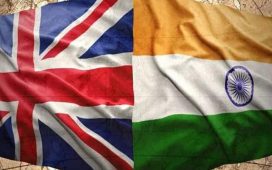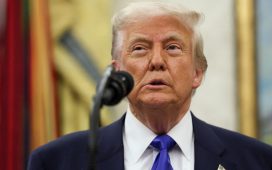
Many see the possible victory of Harris as a victory of American Indians, even though Harris rarely talks about her Indian roots.
How Harris sees her Indian connection
Harris has rarely spoken of her Indian roots though she has spoken about her Indian mother often. In her speech in which she formally accepted the Democratic Party’s nomination for the presidency, she spoke about her mother, Shyamala Gopalan, but not about India, the country she visited as a child. Chennai was the hometown of Harris’s mother. The year 2009 was the last time she visited Chennai carrying her mother’s ashes to scatter them in the Indian Ocean waters.
With a multi-racial background, Harris has projected her black roots more than her Asian connection. During a Q&A event at the National Association of Black Journalists, Donald Trump claimed Harris changed her racial background form Indian to black.
One reason Harris’s Indian ties may not be much of a political factor is that they aren’t a prominent part in her public persona, Sreeram Sundar Chaulia, dean of the Jindal School of International Affairs, told Bloomberg. “Unlike say Rishi Sunak in the UK, for example, who has been very open about showing his Indian and Hindu roots,” he said. Instead, Harris’s African and Carribean heritage — her father is from Jamaica — is the more visible part of her public identity, Chaulia said.
Except a few references to India and Indian culture, Harris has not dwelled much on her Indian roots, though a large number of Indian Americans identify with her, but not many Indians see her as an American with Indian roots and there is less enthusiasm in India about her becoming the presidential nominee than when she had become the vice president as Indians were expecting to see what it meant for them to have a woman with Indian roots as the US vice president.
Harris’s stance that can trouble India
Though Harris as the vice president has largely stayed away from foreign policy issues, her term has not generated much confidence in India as she has leaned towards the section that projects India as a violator of human rights and deficient in democracy.In 2019, Harris came out in support of Indian-American Congresswoman Pramila Jayapal, seen as an India baiter for her anti-India stance. Harris criticized the Indian government for excluding her from meeting with external affairs minister S Jaishankar when he was visiting the US. However, the minister’s meeting was with the House Foreign Relations Committee, a Congressional panel of which Jayapal was not a member, and she tried to impose herself on the engagement. “It’s wrong for any foreign government to tell Congress what members are allowed in meetings on Capitol Hill,” she wrote on X, saying she stood with Jayapal and was glad her colleagues in the House did too.
Harris’s support for Jayapal reflected her close alliance with the leftists in her party who take a hard stance against India on human rights and minority issues.
However, Harris’s victory can pose a bigger worry for India. She has not only aligned with anti-India leftists in her party but has also backed Kashmiri separatism. “We have to remind the Kashmiris that they are not alone in the world. We are keeping a track on the situation. There is a need to intervene if the situation demands,” Harris had said in a statement in 2019 after India repealed Art. 370. She was seeking the presidential nomination from the Democratic Party at that time. Kashmir is a highly sensitive territorial issue for India, and a US president who does not agree to India’s territorial rights might pose a big challenge for the Indian government.
Though Harris is close to anti-India members of her party, she is not known as a foreign policy expert and might not let her past statement dictate her India policy if she wins. However, her lack of background and experience in foreign policy might mean she will not be able to take independent decisions and be guided by the state officials and activists. If she wins, she will become the president when the US and Canada are openly backing Khalistani separatists. As the president, she would need to keep anti-India lobby at arm’s length to build on India-US relations which have seen a lot of growth during the Biden presidency.








